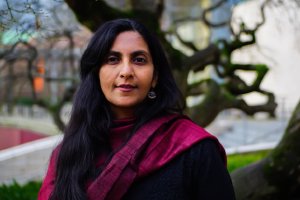The upsurge in anti-Jewish hate crimes in recent years has forced many places of worship to rely on protection from police and private security. The challenge for many security personnel, however, is to do their job in a way that reconciles policing methods with the inclusion and diversity that religious settings must offer to worshippers of all backgrounds.

This issue is central to the efforts of Nate Looney, director of Community Safety and Belonging at the Jewish Federations of North America (JFNA), a New York City-based organization dedicated, among other things, to crisis response issues.
A 37-year-old African-American Jew, Looney believes that heightened security at synagogues tends to make Jews of color feel excluded or unwelcome.
Many Jewish places of worship have long relied on police protection to counter religiously motivated attacks. Jews topped the list of all religious groups targeted for hate attacks in the U.S. in 2020, according to the U.S. Department of Justice statistics.
In Los Angeles County, the country’s largest in terms of population, crimes targeting the Jewish community accounted for 89 percent of all religious hate crimes in 2019, according to the annual Hate Crime Report issued by the Los Angeles County Commission on Human Relations.
“How do you strike a balance?” asks Looney, who was appointed JFNA director of Community Safety and Belonging in April 2022 and whose security background as a military police officer in the Louisiana National Guard and as a trainer for Iraqi police forces overseas makes him well suited to security assignments involving civilians.
“You don’t want to exclude anyone, and yet you want to be discerning of who is coming in the door,” Looney says. “Cultural competency is important. Just the fact that someone who is Black is walking in shouldn’t raise alarms.”
Looney is working on a set of guidelines that he expects to share with Jewish federations across North America in the hope that they will be implemented in the day-to-day operations of synagogues and community centers.
One of Looney’s goals is to promote among security guards a more profound understanding of how diverse the Jewish community is. “We’re starting to have these types of conversations and that’s a great beginning,” he says.
Raised in Los Angeles by a family descended from slaves, Looney is an observant, kippah-wearing Jew. The son of a Baptist father and Episcopalian mother, he embraced Judaism in his teens and formally converted to the faith when he was 26. Yet the color of his skin doesn’t always make him feel welcome in Jewish settings. Once when he walked into a synagogue for Shabbat services dressed in trousers and a button-down shirt, he was told to go to the kitchen.
The Times of Israel reports Looney believes he can channel his painful personal experiences into healing divisions and changing perceptions, and help make a trip to the synagogue a spiritual rather than a scarring encounter for Jews of color.
“It’s educating people about the full diversity of our Jewish community and recognizing that there is a sizable number of black and brown Jews in the United States,” says Looney.
“The harm is caused when black and brown people come in and they’re not coded as Jewish and they are treated as if they are somehow strangers,” says Sandra Lawson, a North Carolina-based black rabbi.
Black, brown and Asian Jews in the U.S. is a relatively small but growing demographic. A 2021 Pew Center survey found only 8 percent of American Jews identify as Hispanic, Black or Asian. But since Pew conducted its first major study of U.S. Jews in 2013, that share of the population nearly doubled to 15 percent among respondents age 18–29. The poll also showed that 17 percent of respondents overall reported living in multiracial households.
“Security and belonging don’t have to be mutually exclusive,” says Isaiah Rothstein, a rabbi who founded JFNA’s diversity, equity and inclusion initiative and serves as the organization’s public affairs adviser.
The son of a white father and a black mother, Rothstein believes Looney’s professional background in security issues, combined with his experiences as a Jew of color, make him particularly suited to advance inclusivity while at the same time realizing that the relationship between law enforcement and minorities has always been a sensitive one.
“Nate is helping us bring an equity lens to make sure all our institutions are safe and secure,” Rothstein says, “while creating a culture of belonging for all Jews and our loved ones.”
_______________
From its beginnings, the Church of Scientology has recognized that freedom of religion is a fundamental human right. In a world where conflicts are often traceable to intolerance of others’ religious beliefs and practices, the Church has, for more than 50 years, made the preservation of religious liberty an overriding concern.
The Church publishes this blog to help create a better understanding of the freedom of religion and belief and provide news on religious freedom and issues affecting this freedom around the world.
The Founder of the Scientology religion is L. Ron Hubbard and Mr. David Miscavige is the religion’s ecclesiastical leader.
For more information visit the Scientology website or Scientology Network.


